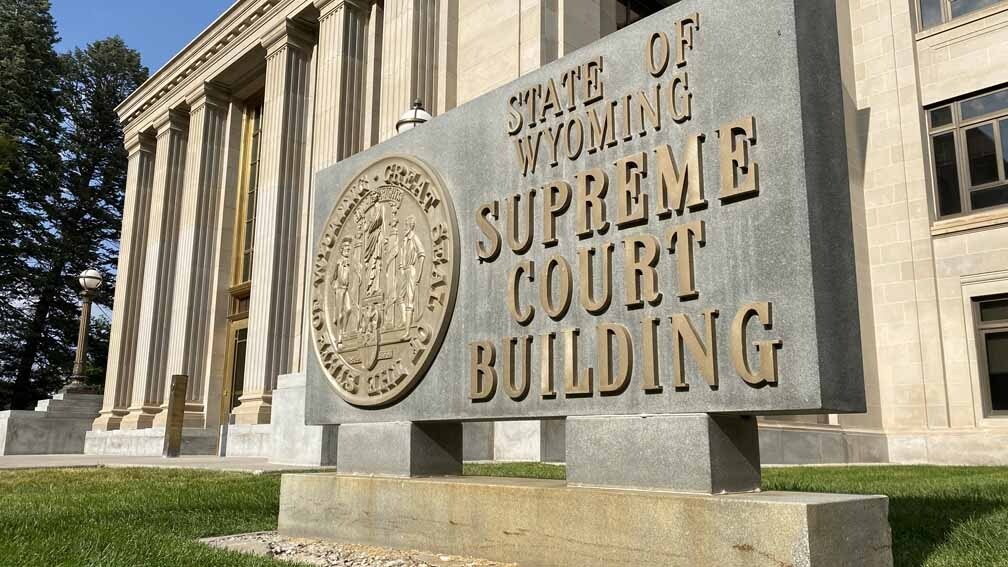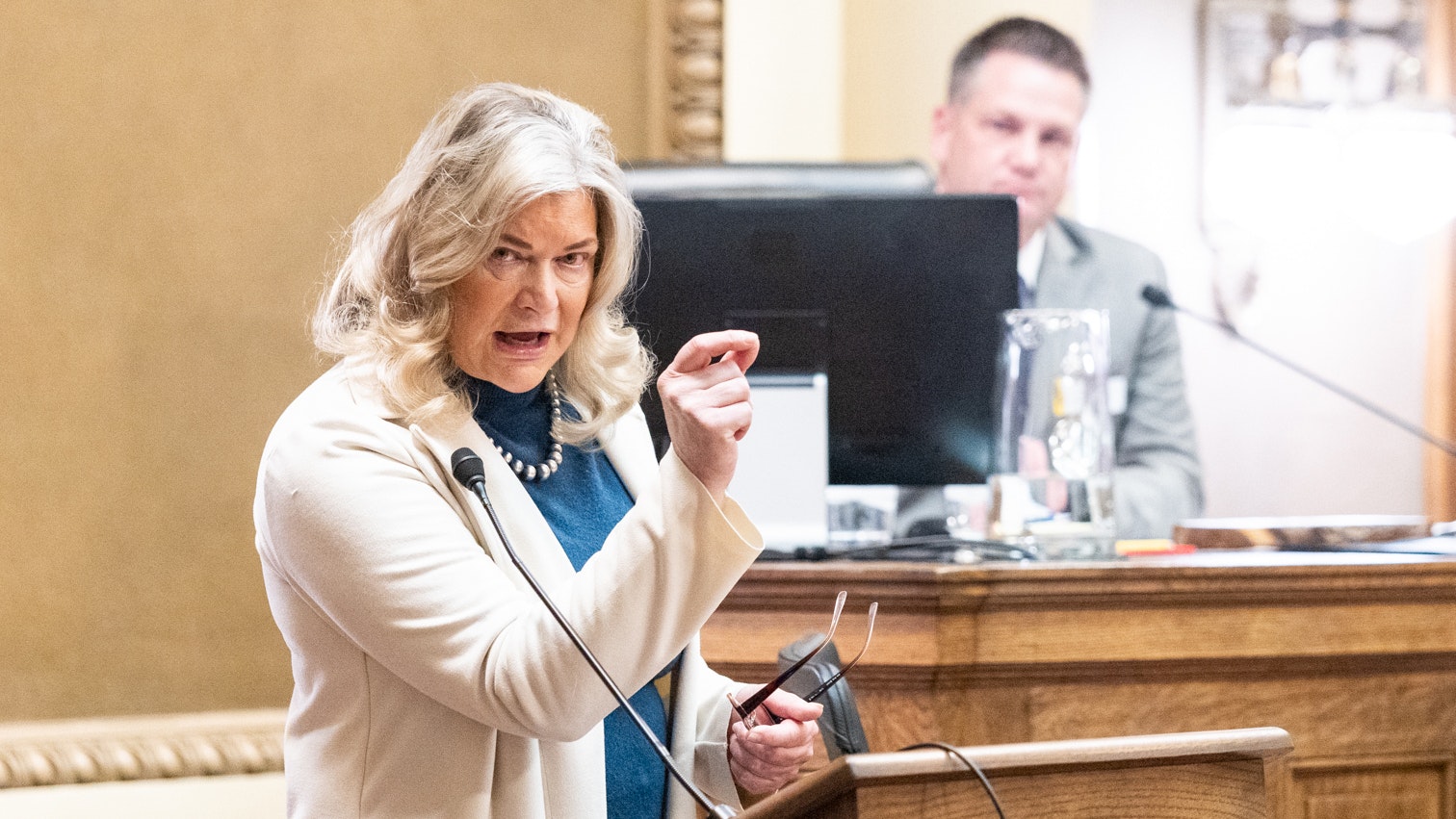Correction, an earlier version of this story said the committee rejected the resolution draft. It did, but it revisited the issue more than an hour later and narrowly adopted it.
A Wyoming legislative committee on Monday narrowly adopted a draft resolution to make Wyoming Supreme Court Justice candidates stand for state Senate confirmation before being appointed.
Meeting in Torrington on Monday, the legislative Joint Judiciary Committee hosted a hearty discussion with Wyoming Supreme Court Chief Justice Kate Fox and other judges on the heels of public controversy surrounding judicial selections and judges’ rulings.
Rep. Jayme Lien, R-Casper, proposed a bill draft to amend the state Constitution to add a state Senate confirmation onto the end of Wyoming’s judge-selection process.
Amending the state constitution requires both legislative passage and the approval of voters.
The proposition failed on a 7-7 tie vote, with all the lawyers on the committee voting against it. But more than an hour later, the committee revisited the issue, and narrowed it, passing a draft resolution on an 8-6 vote to make only Supreme Court justice nominees stand for Senate confirmation.
Those in favor were Lien and Republican Reps. Tom Kelly (Sheridan), Joe Webb (Lyman), Laurie Bratten (Sheridan), Marlene Brady (Green River), Daniel Singh (Cheyenne) and John Kolb (Rock Springs), and Sen. Larry Hicks (Baggs).
Those opposed were Committee Co-Chair Art Washut, R-Casper, Reps. Ken Chestek, D-Laramie; Lee Filer, R-Cheyenne; Committee Co-Chair Jared Olsen, R-Cheyenne, and Republican Sens. Barry Crago (Buffalo), and Gary Crum (Laramie).
This Is How We Do It
Fox defended Wyoming’s “modified Missouri method” system of choosing judges and justices. In that system, three non-lawyers appointed by the governor and three lawyers elected by the Wyoming State Bar, plus the chief justice, review judgeship applicants and nominate three of them for the job.
That part of the process is confidential under the judicial branch’s current rules.
The three nominees’ names are then announced to the public, and over the course of 30 days, the governor chooses one judge (or justice) from among them.
Justices stand for a simple yes/no retention vote every eight years, district court judges every six years and circuit court judges every four years.
It is extremely rare for Wyoming voters to oust one of their judges at the ballot.
“I think we have a darn good system. First I, just for the record, need to make that objection,” Fox told the committee, under lawmakers’ questioning. “I really need to push back on a lot of the bases for this conversation.”
Fox gestured to Wyoming Supreme Court Justice Lynne Boomgaarden (soon to be chief justice), District Court Judge Edward Buchanan and Circuit Court Judge Sean Chambers, who joined her at the meeting and whom she called “darn good judges.”
“So what really is the problem? Continued the chief justice. “Before we start saying how we can fix it, I really want to know what is actually wrong with it. Because I think we work extremely well, and I think our judges are fantastic.”

Where She Gave An Inch
Fox had repeatedly touted the minimal, arguably negligible influence of political forces on judges in Wyoming. And she read aloud from a judicial conduct rule telling judges to resist public “clamor” and political persuasions.
Legislators questioned Fox repeatedly about the opaque nature of the first, 60-day phase of the judicial selection process in which the nominating commission vets an untold number of candidates, whose names don’t become public unless they’re nominated.
It’s difficult to tell if a high-quality candidate was passed over for someone else, the questioners indicated.
On this, Fox said her branch may be flexible. The confidentiality rule is a judicial creation, not a mandate in the Constitution.
“I’d say yes, we’d be open to some tweaking, to some more openness,” she said.
‘Professional Convenience’
No fewer than three times in the meeting, Fox was called upon to reiterate what she called the reasons for the confidential phase.
Practicing attorneys don’t like to spook their clients by announcing they’re looking for a judgeship – and the applicants and commission like to be insulated from political forces during that phase, said Fox.
Rep. Tom Kelly, R-Sheridan, said he doesn’t want to switch to an elections system. But he bristles when Missouri method apologists equate retentions to popular votes, and tout the “professional convenience” of the confidentiality phase, he said.
“We have constituents who are very concerned about the opaque nature of how the judges are picked in the first place,” said Kelly. He said he believes judges shouldn’t have to face political pressure, but would like to answer the transparency question for his constituents.
“The only explanation I’ve heard (for the confidential phase) is, pretty much, professional convenience for those applicants,” said Kelly. “As people who go into the ringer to go into public service, and had our lives laid out there – there was absolutely no convenience for us, whatsoever, when we decided to serve.”
Fox countered, reiterating her point about avoiding political pressures as well.
She also said that voters could get more involved with the courts, read Supreme Court opinions and watch cases if they want to know the hearts of judges.
“There is a great deal of transparency” in the judicial branch, she said.
Indeed, the Wyoming Constitution mandates that courts be “open.”
There are a few confidentiality measures built into the judicial branch’s workings, such as: Some laws hinder public access to sex-crime proceedings at the preliminary phase. And Wyoming’s vast geography can hinder public or media access to court hearings under judges who will not grant virtual access.
Other than these and a few other exceptions, however, the courts and their documents are public and accessible.
The Lawyers
Two of the committee’s three attorneys spoke in defense of Wyoming’s current system.
The process “results in us getting very good judges and justices appointed to the bench,” said Crago. “I’m super proud of how it works in Wyoming.”
Olsen noted that if the public wants to be more involved in the selection process, people can contact the governor during his 30 days’ deliberation.
The Massive Question
Residents are keeping a keen eye on the Wyoming Supreme Court as it contemplates Johnson v. Wyoming – which is roughly the state’s equivalent of Roe v. Wade.
Teton County District Court Judge Melissa Owens ruled in November that abortion is health care, and that access to it is a fundamental right under the state Constitution’s promise of health care autonomy. That decision came about two weeks after she survived her retention vote in Teton, Sublette and Fremont Counties.
Incensed by that and other recent maneuvers in the judicial branch, the Wyoming Freedom Caucus, a socially-conservative group of Republican lawmakers, has vowed to pursue judicial reform.
The caucus has not officially endorsed exchanging Wyoming’s selection system for popular elections. But it has proposed the idea of adding state Senate confirmations to that process as a layer of popular control in an otherwise tightly-contained process.
The Wyoming Supreme Court is now reviewing Owens’ ruling in Johnson v. Wyoming. Though she retires in a week and the current Wyoming Attorney General Bridget Hill will fill her bench vacancy, Fox will preside over the abortion decision, the high court told Cowboy State Daily last week.
Retired justices and judges can be recalled to decide cases, the state Constitution says.
Clair McFarland can be reached at clair@cowboystatedaily.com.





